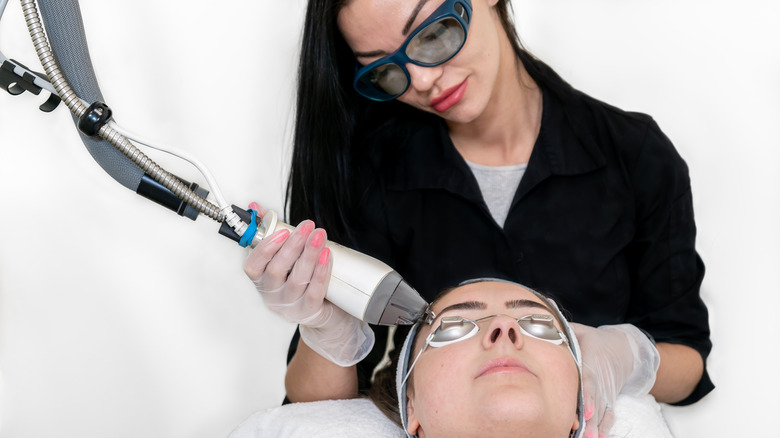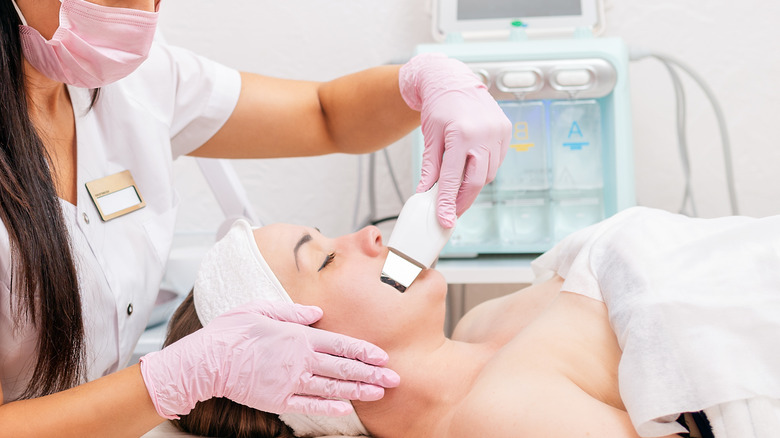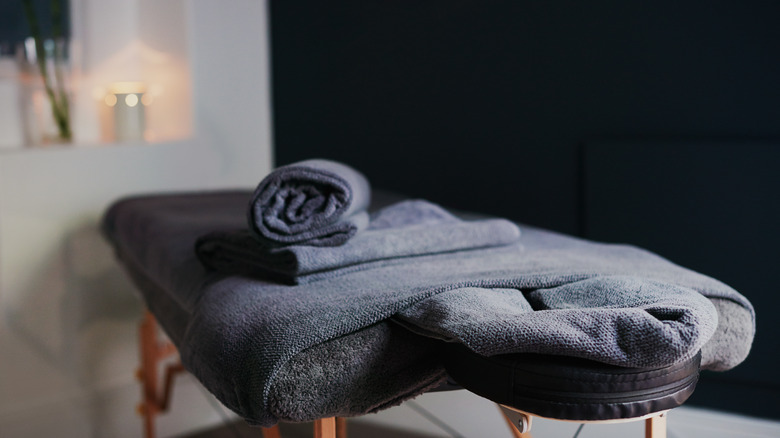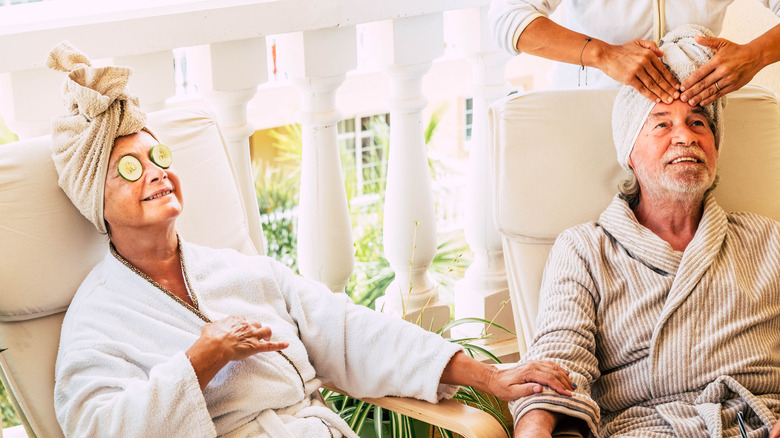Red Flags That Prove You're In A Bad Spa
Visiting a spa to improve and preserve wellness has been practiced for centuries. Spa services can range from a self-indulgent day of rest and relaxation to a high-tech aesthetic treatment performed by medical professionals. "Going to a spa is a way of getting taken care of that is psychologically and culturally acceptable — and we can carry that feeling of being cared for with us for a period of time, and very often that can help us cope better with stress," Virginia Sadock, a professor of psychiatry at NYU, told WebMD. However, if the spa is not staffed by trained and licensed professionals, a well-meaning trip to the spa can be harmful, traumatic, or even deadly.
Facial resurfacing and body contouring treatments have become more comprehensive and technological, and mistakes made during treatments can permanently alter a person's appearance, including severe burns and scarring. Some spa visitors have also experienced temporary to permanent discoloration and patterning of the skin from poorly executed treatments, according to Self. Even massage, a spa service favorite for stress reduction and medical issues, can also present risks. Thankfully, many risks can be mitigated by choosing good spas — spas that do not exhibit the following red flags.
The spa is operating without the proper licenses
One of the first steps a legitimate spa owner takes when opening a spa facility is to ensure that the business and the staff have the appropriate licenses for administering treatments. The licenses required for the spa vary by state and also depend on which treatments are offered at the spa.
Medical spas, or med spas, must meet a rigorous list of requirements because med spas offer advanced treatments that must be administered with the oversight of a licensed physician. For example, the use of prescription drugs, medical services, injections, surgical procedures, and medical devices requires a practitioner of medicine to perform the services. State laws vary on who can perform services in place of a supervising physician, but clients should be notified of the name and title of the medical professional who will perform the services.
Depending on the state, the spa may also be required to display the licenses for visitors. In 2019, several Florida day spas suspected of human trafficking were cited for failure to display licenses of the business, along with the licenses and 2" x 2" photos of each massage therapist that is required by Florida law, TC Palm reported.
At the very least, the licenses should be available to view upon the request of any patron who wants to ensure the safety and legitimacy of the spa. It's a red flag if spa management is unable to produce proof of license.
The spa is not a member of any professional organizations
Legitimate business owners know that joining a professional organization or trade group will benefit the business in the long term. That's because professional trade organizations often operate under a code of ethics and require member organizations to adhere to the same code. Trade organizations also work to continually update member businesses on changes in the industry, including licensing and educational requirements.
In the case of a spa, professional trade groups can also disseminate new scientific findings that may impact the therapeutic modalities that are offered. Trade groups may also highlight improvements in the technology of the devices used in spas. The International Spa Association (ISPA) offers continuing education for owners and practitioners and connection to other professionals for all members.
If a day spa is not a member of a professional organization, request to see the spa's written code of ethics. If the spa does not have a written code of ethics, consider this a red flag. A business should have this — whether or not it is required by law. The code serves as a promise to operate under a particular set of guidelines, and it can also guide spa practitioners in making the decisions that keep clients safe during treatments.
The general operations of the spa raises questions
Collective Liberty estimated that there are over 9,000 businesses operating as illicit massage businesses in the United States. These businesses are staffed by individuals who have been brought into the U.S. through human trafficking and are being coerced to work in the illegitimate massage parlor. Individuals who visit massage businesses should be especially aware of the red flags of human trafficking.
When entering a day spa, the feel of the spa should be serene, comforting, and accommodating. The lobby should be welcoming and easily accessible. If the doors are locked and customers have to be buzzed in, this may be a warning sign that the spa is offering illegitimate services. The spa should also operate during regular business hours. If the spa is only open during late-night hours or if the spa offers 24-hour services, these could also be red flags that the business is offering illicit services, according to SBW Law.
Legitimate businesses will also accept other forms of payment besides cash, such as credit cards, debit cards, or online payments. If management is not creating an electronic trail of the revenue around a business, this is a red flag that the business is not legitimate.
The prices seem too good to be true
Spa services are fairly standardized, although spas may still add unique products or techniques to help set their menu apart from other businesses. Traditional day spas offer facial treatments, massage treatments, hair removal, and skin treatments, such as wraps or scrubs. If the spa is connected to a cosmetology license, the business may also offer salon services, such as hair and nail care.
Beware of services advertised well under the market rate. The average rates vary depending on the location of the spa, but there are some average costs to keep in mind. Massage services range from $75 to $200, facials range from $60 to $150, and salon services range from $50 to $200.
If the spa service rates are much lowered than these figures, it may be wise to check other spas in the area to see how local rates compare. Low rates can signal that the spa is cutting financial corners or, worse, using trafficked individuals to provide services, according to compliance training company Easy Llama. Massage therapists, estheticians, and cosmetologists must all attend schools that have a minimum number of hours required to obtain certification, and spas should be paying professional rates to these individuals. A low-service rate could also signal that the spa is not using licensed staff, even if the spa is providing legitimate services.
The spa staff does not perform a thorough intake before the service
Some spa services are not for everyone. There are many reasons why an individual should abstain from certain spa treatments, and these are called contraindications. In order to identify any contraindications prior to treatment, management or technicians should perform a thorough intake. If the spa does not perform an intake, that's a red flag that may lead to serious harm!
Intake inquiries keep clients safe, and an intake process should include listing current and past injuries, illnesses, surgeries, allergies, and medicines. The intake process is also a good time to communicate any other issues around comfort to ensure that the treatment is an enjoyable experience for the client. Some contraindications for massage therapy include fever or acute illness, intoxication, active cancer, and infectious skin conditions. Some spas and medical spas use electrical treatments, which are often not suitable for people with diabetes, facial implants, and skin lesions, nor those who are pregnant, as Eco Skin Clinic explained.
Not performing an intake indicates that the spa management is prioritizing revenue over client safety. Performing services on a person when it is not advisable can result in injury, illness, or death, and the intake procedure should be handled with the utmost importance and priority.
The medical spa procedures are not conducted by licensed professionals
Medical spas, or med spas, offer services that are a step above the typical day spa. Non-surgical aesthetic treatments such as laser skin resurfacing or body contouring are performed on clients in a relaxing, serene spa setting. Even under a physician's supervision as required, med spa staff may still be lacking experience or education, and clients should investigate med spas carefully before booking a treatment.
According to one 2020 study, 70% of the 306 survey respondents experienced complications from med spa treatments. The top five complications resulting from med spa treatments were burns (89.7%), discoloration (80.1%), product misplacement (74.6%), scarring (69.4%), and bruising (52.9%). A noteworthy finding from this study is that dermatology spas had the least amount (2.4%) of reported complications of all med spas, which indicates they may be the safest choice.
Although med spa staff may consult with the supervising physician on the menu and procedures, the physician may not be required to supervise the actual treatments. Med spas are typically staffed with estheticians and medical professionals, such as nurses and physician assistants. Clients who are investigating a potential med spa should consider the experience of the practitioner performing the treatment and look for med spas that have certified dermatologists performing services.
The spa does not utilize good hygiene and sanitation practices
Spas services involve touch and the potential transmission of germs and communicable illnesses, so a definitive red flag of a bad spa is the lack of sanitation and hygiene practices. Spa management is responsible for providing an environment in which staff can maintain the hygiene and sanitation of the spa and keep clients safe.
According to the Professional Skin Care Guide, spa staff should always wash hands and wipe down surfaces with disinfectant before and after administering services. Staff should also refrain from using or touching personal items during treatment, such as cell phones. Although gloves are not typically worn during a massage, gloves should be utilized during invasive procedures of the skin.
Technicians should sanitize the tools used for services between each client and have access to a hand washing station in, or just outside, the therapy room. Tools should be properly stored in a sanitary solution between treatments, and technicians should wear appropriate professional clothing and keep their hair tied back. To stay safe as a client, be diligent in checking for these signs of cleanliness.
The spa has bad reviews
One of the simplest ways to check for red flags before visiting a spa is to check the online reviews. Customers can read reviews of spas through sites like Spafinder.com. Although some businesses give incentives for customers' good reviews, it is often honest clients with legitimate issues that leave negative reviews. Be especially aware of customers who complain of damage or bodily harm as a result of treatment.
Illegitimate massage parlors may also have reviews posted to erotic sites to entice customers. In 2021, a man gunned down eight women in three spas around the Atlanta area that were offering sexual services to customers. Upon further investigation, authorities said there were red flags in the online spa reviews that indicated the spas were offering sexual services at the spas (via USA Today).
To avoid illegitimate spas, look for unofficial phrases such as "full service" as clues to the legitimacy of the business and services provided. At least one of the spas in the Atlanta shootings was offering sex as a menu option without using any code words. It is worth a check of review websites to ensure the spa is safe and not using trafficked individuals for services.
There is evidence of technicians living on site
Another red flag that indicates human trafficking is evidence that staff may be living at the spa full-time. In 2019, Florida State Department of Health inspections of spas revealed suitcases, bedding, and a refrigerator packed with food at one spa, according to TC Palm.
Another investigation of illegitimate spas in Florida revealed that technicians were made to wear provocative clothing during services and sleep on massage tables when the tables were not in use. Unfortunately, the owners of the spa had passed every point of inspection and had never faced any disciplinary action until the businesses were found to be human trafficking, WPBF reported.
Individuals who have been brought to the United States through human trafficking may have no place to live outside of the spa. They are often forced to live on-site, be on call for services at any time, and share cramped living conditions among other trafficked individuals. The Polaris Project reports that these women are almost all from South Korea or China, speak very little English, are typically mothers between the ages of 35 and 55, and are trafficked through fraud, emotional manipulation, and threats of deportation.
The spa is not accomodating or inclusive
Clients should feel welcome at wellness spas, regardless of gender, race, disability, and age (aside from young age — because spas may reserve the right to refuse services to minors).
If the spa refuses to serve women, this could be a red flag that the spa is offering illicit sexual services to men. Men began visiting spas more frequently in the past 20 years, and legitimate spas are typically trying to entice more men to use spa services. However, legitimate spas would never refuse services to a woman on the basis of gender.
Wellness spas should similarly be inclusive to individuals with disabilities. Accommodations have improved in recent years — a SpaFinder survey of spas worldwide revealed that "80 percent reported they had an accessible entrance; 50 percent said they had at least some special equipment/interior facility design; and 43 percent reported they had a therapist(s) with special training for the needs of people with disabilities." Individuals with disabilities can discuss accommodations, needs, and what to expect with spa staff upon booking the services. A spa that is unwilling to accommodate the needs of disabled persons is a red flag.
The spa does not utilize common safety practices to prevent theft or assault
Even legitimate spas can still experience problems arising from theft. The safest spas will have policies and methods in place to prevent criminal activity. These can include providing lockers for storing personal belongings and using surveillance cameras.
Although surveillance cameras are useful in common areas to keep staff and clientele safe, cameras should not be installed in locker rooms, bathrooms, or massage and treatment rooms. In treatment rooms, technicians should also have appropriate conversations and ask the right questions to understand your therapy needs. A therapist should not comment on your body or physical appearance unless it is to gather information that may impact the massage experience.
Good technicians also warn clients when and where touch is about to begin, and they check in with clients throughout the treatment to ensure the client is comfortable. Professionals know how to keep clients fully covered while repositioning them on the table, so the client should never feel that their body is inappropriately exposed to the therapist. A spa technician should never touch a client's genitals under any circumstances.
How to report a spa that is putting clients or staff at risk
A trip to the spa should be a relaxing, rejuvenating experience. At no point should clients feel uncomfortable, coerced, disrespected, or harmed.
If you are concerned about a particular business, find out who is regulating day spas and medical spas in your state. The agencies that regulate spas are often found at the Department of Health in each state. You can contact the state agency that regulates spas and ask for a recent inspection report of the spa you are planning to visit. Some business owners are savvy about passing inspections despite running illegitimate businesses, so it's important to look for red flags and use good judgment if something seems suspicious about the spa. You can also file a report with the state's oversight organization if you think that there are unsafe or criminal practices being conducted.
If you suspect a business is participating in human trafficking, contact the National Human Trafficking Hotline at (888) 373-7888.












